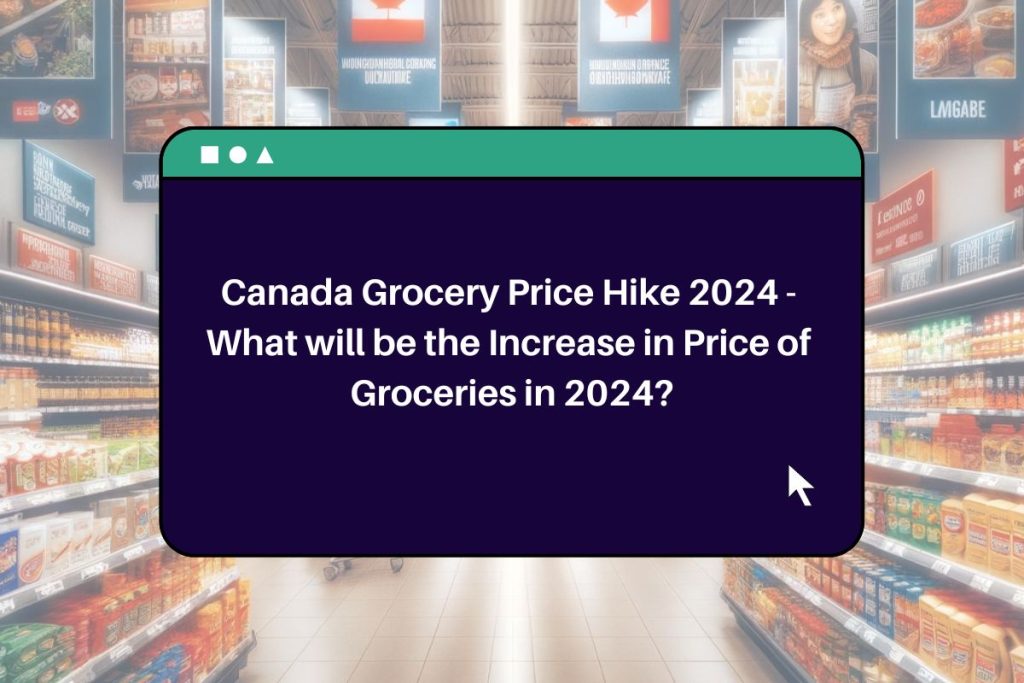According to a recent analysis, the average inflation rate for food goods in Canada is expected to rise between 2.5 and 4.5 percent in 2023, compared to an average increase of five to seven percent in 2023. According to a report, the total rate of inflation will drop to between 2.5 and 4.5 percent in 2024. For meat, vegetables, and bread goods, the biggest rises are between 5 and 7%. A little deflationary phase might occur in 2024, bringing down the cost of several staple foods.
In 2024, rising energy prices, inflation, and climate change will be the main causes of rising food prices. Geopolitical tensions, family financial limits, and proposed and current rules and regulations, such as the grocery competition in Canada bill C-56 and plans for plastic packaging reductions in the food industry, might also have an influence on inflation, food costs, and buying power. Here i will go through Canada Grocery Price Hike 2024 and Why are food prices rising in Canada?
Canada Grocery Price Hike 2024
The 14th edition of Canada’s FPR predicts that overall food costs will rise by 2.5 to 4.5% in 2024. In comparison, the average in 2022 was 10.3%, and in 2023 it was 5.9%. An annual partnership between academics at the University of BC, Dalhousie University, the University of Guelph, and the University of Saskatchewan results in a study that looks at the effects of food inflation on Canadians and potential causes of patterns in food price inflation.
According to the research, the average family in Canada would spend $16,297.20 on food in 2024 a $701.79 hike. This suggests that Canadians spent less on food in 2023 despite inflation. This implies that Canadians cut back on the amount or quality of food they bought, or they replaced expensive items with less expensive ones, to save money on groceries.
Canada FPR Predicts Families to Pay $ 700 More in 2024
Canada’s FPR forecasts that food costs will rise in 2024, although less than they did the previous year, following a year in which the growing expense of groceries received a lot of attention. The University of Guelph, Dalhousie University, University of BC, and University of Saskatchewan shared the yearly projection, which projects that food costs would climb by 2.5 to 4.5 percent in 2024, or up to $701.79 for a family of 4 in Canada.
This is nevertheless difficult for many families, whose budgets are already tight due to rising housing, utility, and loan prices, even though it is less than the 5–7% increase that is anticipated for 2023. This shows that, maybe as a result of other rising expenses, Canadians may be purchasing less food overall or of lower quality.

Canadian food price increases Predictions 2024
- Bakery: 5% to 7%
- Dairy: 1% to 3%
- Fruit: 1% to 3%
- Meat: 5% to 7%
- Other: 2% to 4%
- Restaurants: 3% to 5%
- Seafood: 3% to 5%
- Vegetables: 5% to 7%
Where are Food Prices in Canada Headed in 2024?
- As to the report, which projects a 2.5 percent to 4.5 percent increase in overall food costs, food affordability is still a major worry for Canadians. It is projected that in 2024, the average family of four would spend $16,297.20 on food, an increase of up to $701.79 over the previous year. The report, stated that the most notable increases range from five percent to seven percent in the categories of bakery, meat, and vegetables.
- The constant increase in food costs is a reflection of larger inflationary will impact the economy, as most Canadians are aware, with the exception of those who hold the belief that food prices are exclusively determined by one person or one firm.
- Food costs are not the only thing driving up costs; other factors contributing to this trend include higher manufacturing and transportation costs as well as the fallout from changes in the world economy. The combination of these factors has led to a continuous increase in food prices, which is a complex economic problem.
Why are food prices rising in Canada?
- As per some experts, practice of making unfair profit, increasing price of grocery, or carbon taxes might be the cause of the sharp increase in food prices. As a result of inflation, even though grocery store earnings have increased since the pandemic started, they have only decreased or remained unchanged in 2022.
- In the meanwhile, changes in food prices in 2024 are anticipated to be influenced by geopolitics and climate change. In addition, Canadians’ finances are anticipated to be further taxed by rising food prices, high loan rates, and other growing expenses.
- The range of predicted food costs for 2023 was observed, with the exception of bread foods, which were predicted to cost less, and dairy products, which were predicted to cost more. Canada ranked third among the G7 in terms of food inflation.
- As Canadians are really spending less on food than they should. Canadians spent 3.26 percent less on retail food and beverage purchases in 2023. As a result, overall food spending in 2023 was less than anticipated.
| Our Homepage | Matricbseb.com |
- About the Author
- My Recent Posts
